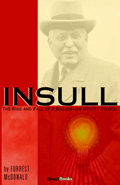|
|
|
|
||||||

|
Insull: The Rise and Fall of a Billionaire Utility Tycoon This is an important book about an often-forgotten figure who had a tremendous impact on our lives and future. Publisher Comments Next to Thomas Edison, Samuel Insull is the name you should remember as the most important and perhaps the most notorious person in the utility business. He was the billionaire utility tycoon from Chicago whose gas and electric empire operating in over thirty states in 1932, causing a million investors to lose two to three billion dollars. Starting as Thomas Edison's private secretary in 1881, he was responsible for establishing centralized electric supply. He organized the Edison General Electric Company before the industrial giant of the same name, working out a model of nationwide distribution and promoting rural electrification. One of the most significant accomplishments was acquiring effective government regulation of public utilities. The author does not make judgments as to whether Insull was good or bad. He merely wants us to know the man for what he did. From the back cover blurb: An astute businessman, he practiced "mass production" and "selling at the lowest possible cost" long before those ideas became popular. In addition, he successfully applied the concepts of load and diversity on a large scale -- factors on which all utility rates are based. On the financial side, his innovativeness in devising ways to market securities made possible gigantic modern corporations owned by anonymous millions and therefore owned by nobody. Insull was instrumental in acquiring effective governmental regulation of public utilities. He pioneered welfare programs long before labor or even government became aware of their importance and encouraged the growth of labor unions. From Henry Berry, Turnarounds and Workouts, March 15, 2006: Few people today have heard of Samuel Insull. Yet in the 1920s and 1930s he was as well-known and, in the end, as infamous as Ken Lay, Bernie Ebbers, and other disgraced corporate executives. Insull was brought to trial by the U.S. government, his reputation destroyed, and his fortune lost. Through it all, the political and legal drama was played out in the leading newspapers. After an education at Oxford, Insull worked at a London bank that was the European representative to Thomas Edison. In that position, Insull familiarized himself with the latest inventions and operations in the growing field of electricity. Before long, he was headed to the United States to become the famous inventor's secretary. Insull proved himself invaluable to Edison. He managed Edison's business affairs and financial matters, becoming one of the "Edison" men on the board of directors of the Edison General Electric Company (now General Electric Company) founded in 1889. In 1892, Insull became the president of the Chicago Edison Company. In the 1890s, Chicago aspired to be recognized as America's leading city. This aspiration was not unrealistic considering Chicago was the host city for the World's Fair of 1893. Insull's inexhaustible energy and bold ambition and ideas were a good match for Chicago's vision. It was at the World's Fair that Insull was able to demonstrate the central role that electrical energy could play in the growth of a modern city. Insull parlayed the fame and success of the World's Fair to become one of the most important figures in Chicago and the united States. He formed relationships with local and national politicians, bankers, top business leaders, and investors. In pursuit of his outsized ambitions for himself, his company, and electrical energy, he became involved in increasingly complex financial transactions with an increasingly wider circle of individuals. Acquiring and merging with other electric companies and related businesses, Insull received more and more publicity as an influential, forward-thinking corporate executive. Innovative ideas introduced by Insull included open-end mortgages for business expansion, rigorous cost accounting standards, recognition of labor unions, and mass marketing. As is the case with many failed businesspersons, Insull's downfall was brought on by tangled, questionable financial transactions. In 1930, a Chicago grand jury indicted Insull, his son, and some associates. Insull was eventually acquitted of all charges, but his downfall was complete. A Chicago newspaper summed up the trials as: "Insull and his fellow defendants--not guilty; the old order--guilty." In this masterful biography, Insull is presented as a flesh-and-blood character with magnified yet recognizable talents, dreams, and flaws. He became enmeshed in political and economic forces beyond his control and became a scapegoat for the Great Depression that was unfolding. From Amazon: While the topic may sound dry and uninteresting, in fact McDonald presents a fascinating tale of how the electric utility industry came to be the way it is today. Anyone seriously considering the current "restructuring" or "deregulation" of electric utilities should be familiar with this work. Clearly a "10" for anyone interested in understanding why we have massive power plants, "stranded costs" -- and a very hard time moving to a more competitive model. PMMarston
|
|
|
|
home
| about
us | contact
us | related
sites |